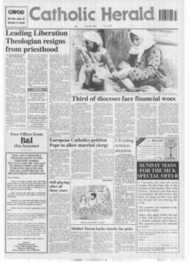Page 4, 3rd July 1992
Page 4

Report an error
Noticed an error on this page?If you've noticed an error in this article please click here to report it.
Tags
Share
Related articles
Third Of Dioceses Face Financial Woes
Bishop Cancels Debt Of Schools In Jubilee Act Of Forgiveness
Sharing By Hexham And Newcastle The Debtless Diocese
Californian Dioceses Settle Sex Abuse Cases
Dismay At Cost Of Leeds Appeal
We need a parish tax
WHEN Bishop David Konstant, revealing an almost unprecedented candour in the field of diocesan finances, admitted that his diocese — one of the largest in the country could slide £2 million into the red, he was blowing the whistle not only on the tight-fisted attitude of Catholics in his own diocese, but on parishioners everywhere in this country. Leeds, as a Catholic Herald survey brings to light this week, is not alone in suffering from empty coffers.
With more than a million and a half practising Catholics in England and Wales, why is the Church in financial straits? What can we, the practicing Catholics, do?
First, let us take a page from Bishop Konstant's book and dismiss any attempt at covering up the issue. For far too long the Church has been forced by secular society into an uneasy alliance with money. The good cleric, as Erasmus wrote, was to touch money only with the thickest of gloves. This puritanical attitude, born of resentment for the material possessions and the property rights which the Church enjoyed from the time of its recognition by the Edict of Milan, was justified in the days of St Francis, when hedonism had replaced theology as the favourite object of monastic study; and was valid at the time of Martin Luther, when the Church had become a Sainsbury's for indulgences. But this attitude is now not only anachronistic, it is downright obstructive, making for secrecy where there should only be clarity, making for misconceptions where there should only be truth. The equation is or should be clear: the Church is an organisation, and in order to operate smoothly and efficiently it needs money — our money.
Once we have taken the issue out of the closet, let us pragmatically work out the solution. The Church is not a vestige of the toppling Maxwell empire in need of fund-injection; it is not a televangelist's channel seeking millions for round-theclock healing and speaking in tongues: when the Church asks for our money, it is asking for our support in her efforts to rekindle, safeguard and develop our faith.
We expect our government to look after education, health, the unemployed and roads. In return, we pay taxes. We ask of our Church not only to look after our spiritual welfare but also to take care of earth-bound considerations: the up-keep or establishment of monasteries and convents, parish churches and clubs, foreign missions and local schools, elderly people's homes and orphanages. In return, we are content to drop the odd coin in the Sunday collection basket.
This state of affairs has led to insufficient funds and a oneway traffic in complaints and criticisms from parishioners who, though they refuse to put their money where their mouths are, endlessly point out what the Church is not giving them.
No more. We must roll un our sleeves. discard our ingratitude, and invite all who call themselves practising Catholics to accept a parish tax.
A graduated parish tax, levied at the diocesan level and taking into account the income of Church-going parishioners, would ensure individual responsibility within the Catholic community: once they are paying for the bingo hall or the new home for the elderly, parishioners will want to ensure that it is run according to their specifications. Such a tax would increase clerical accountability by urging diocesan bishops and parish priests, who will need to consider the wishes of their "constituents", to listen all the more carefully to their parishioners, to weigh their demands, to debate with them the wisdom of one investment over another.
By strengthening in this way the link between clergy and laity, the parish tax will not only replenish the coffers of our Catholic community, it will also revitalise the somnolent dialogue between priest and parishioner.
blog comments powered by Disqus











